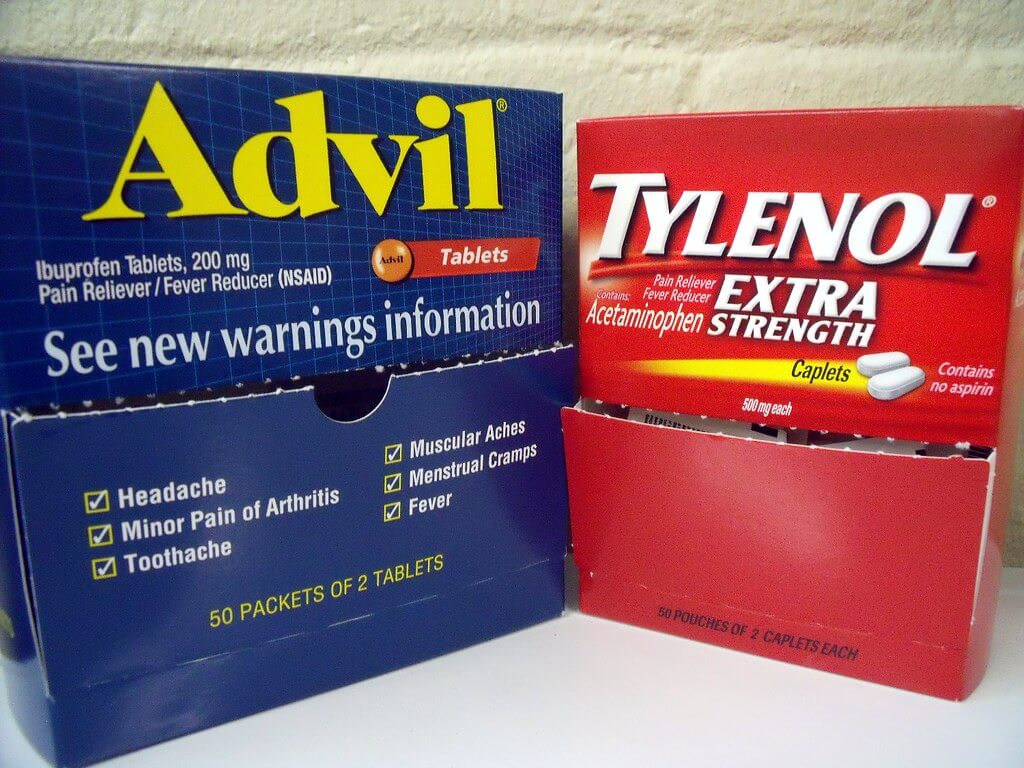Is Tylenol or Ibuprofen Better for Back Pain?
Ibuprofen (Advil; Motrin) or Naproxen (Aleve) are better than Tylenol (acetaminophen) for back pain. In this article, you will learn how medical studies show that over-the-counter medications like ibuprofen or naproxen are more effective than Tylenol (acetaminophen) at relieving back pain.
About 84 percent of adults will have low back pain during their lifetime. You may be out gardening, you bend over to pick up that flower that you’ve been wanting to prune for a while, and now what happens is that your back flares up.
You should rest and ice the lower back to decrease the inflammation (For a detailed explanation of what to do right after a back injury, click on the article: How to Relieve Sudden Back Pain). If rest and ice are not enough to relieve the back pain, you may be wondering whether you should take Tylenol or ibuprofen for the pain as well.
In this article we shall be comparing the mechanism of action, effectiveness, side effects, and so much more between Tylenol (acetaminophen) and a group of pain relievers called NSAIDs which include ibuprofen (Advil; Motrin) and naproxen (Aleve).
- What is Tylenol?
- What is Ibuprofen or Naproxen?
- Effectiveness of Back Pain Medications
- Safety of Back Pain Medications
- The Verdict: Tylenol vs Ibuprofen (or Naproxen)
What is Tylenol (acetaminophen)?
Before we dive into the details, I want to go over some quick facts about Tylenol (acetaminophen). Tylenol is a popular over-the-counter pain reliever and fever reducer. It is used for many types of pain including headaches, muscle aches, sprains and strains (including back pain), menstrual pain, and certain types of arthritis. It is also found in many cough and cold medications because it can reduce fever in both adults and children.
What is Ibuprofen or Naproxen?
Ibuprofen (Motrin; Advil) and Naproxen (Aleve) are also very popular over-the-counter pain relievers and fever reducers. They belong to a class of drugs called Non-steroidal Anti-inflammatory Drugs (NSAIDs). Similar to Tylenol, these drugs are also used for many types of pain including headaches, muscle aches, sprains and strains (including back pain), menstrual pain, and certain types of arthritis. They are also found in many cough and cold medications because they can reduce fever in both adults and children.
Effectiveness of Back pain Medications
Both Tylenol (acetaminophen) and NSAIDs (ibuprofen or naproxen) are commonly used to treat back pain. But is Tylenol or ibuprofen (or naproxen) better for back pain? This video is a good overview of the differences:
Tylenol Effectiveness for Back pain
Tylenol (acetaminophen) has historically been used for back pain. However, Tylenol has very limited benefit in patient’s with back pain. According to one study:
- Tylenol “does not produce better outcomes than placebo for people with acute low back pain, and it is uncertain if it has any effect on chronic low back pain.”
Tylenol is thus no longer recommended as a first-line treatment for low back pain. It may be worth a try if you cannot take ibuprofen or naproxen due to medical reasons. The dose you can try is this:
- Under 65 years old: Acetaminophen (Tylenol) 650 mg orally every six hours as needed (maximum 3 grams per 24 hours)
- Over 65 years old: Acetaminophen (Tylenol) 500mg orally every six hours as needed (maximum 2 grams per 24 hours)
Ibuprofen or Naproxen Effectiveness for Back pain
Ibuprofen or Naproxen belong to a class of drugs called NSAIDs (Non-steroidal Anti-inflammatory Drugs) that are first-line treatments for back pain. According to one study:
- “The evidence from the 65 trials included in this review suggests that NSAIDs are effective for short-term symptomatic relief in patients with acute and chronic low-back pain without sciatica”
Thus NSAIDs such as naproxen and ibuprofen are modestly effective for low back pain.
The doses you can try are:
- Ibuprofen 400mg to 600 mg four times daily or
- Naproxen 220mg to 440mg twice daily
You should take the dose on a scheduled basis rather than as needed for about 1 to 2 weeks. Taking an NSAID on a schedule basis for about 1 to 2 weeks will really decrease the inflammation in your back. After 1-2 weeks, you can take the NSAID on an as needed basis.
You do not want to take an NSAID like ibuprofen or naproxen longer than 2 weeks without the supervision of your doctor because these medications have lots of side effects if you take them constantly for a long time. The safety of NSAIDs shall be discussed below.
Safety of Back Pain Medications
Both Tylenol (acetaminophen) and NSAIDs (ibuprofen or naproxen) carry side effects. The side effects they carry are very different. Additionally, these medications may be unsafe if you have certain medical conditions (these are called contraindications).
Safety of Tylenol (Acetaminophen)
Acetaminophen (Tylenol) is generally well tolerated. Liver toxicity is the most important concern when taking acetaminophen (Tylenol). Here are some tips of how to prevent liver side effects when taking acetaminophen (Tylenol):
- Do NOT take more than 3 grams per day of acetaminophen if you are younger than 65 years old.
- Do NOT take more than 2 grams per day of acetaminophen if you are older than 65 years old.
- Do NOT take acetaminophen with alcohol
- Do NOT combine acetaminophen with other medications that also contain acetaminophen (for example, many cough and cold medications already contain acetaminophen)
Other less common side effects are:
- Kidney disease
- High Blood Pressure
- Stomach and Intestinal Ulcers
I would not worry too much about these last 3 side effects unless you already have risk factors for these side effects.
Safety of Ibuprofen or Naproxen
To prevent side effects from NSAIDs such as ibuprofen or naproxen, you should take the lowest effective dose for the shortest duration necessary (such as 1-2 weeks). You should also take ibuprofen or naproxen with food to minimize stomach upset.
If you have one or more of the following medical conditions below, do NOT take ibuprofen or naproxen without your doctor’s permission (these are called contraindications):
- 65 years of age or older
- Kidney disease
- High blood pressure (uncontrolled)
- Ulcers or bleeding in your digestive tract (stomach, esophagus, intestine)
- History of stroke or heart attack
- You are taking blood thinner medications
- You are taking steroids such as Prednisone or Dexamethasone for a month or longer
For more detailed information on the safety of Naproxen and Ibuprofen, click on this article: Is Naproxen or Ibuprofen Better for Back Pain?
Tylenol vs Ibuprofen (or Naproxen) for Back Pain
So which is better for back pain: Acetaminophen (Tylenol) or an NSAID (Non-steroidal Anti-inflammatory Drug such as ibuprofen or naproxen)?
As you can see from this article, NSAIDs such as ibuprofen or naproxen are more effective than acetaminophen for low back pain. This is in part due to the fact that NSAIDs can reduce inflammation in your lower back, whereas Tylenol does not.
However, if you have medical reasons that put you at risk of side effects with NSAIDs (kidney disease, high blood pressure, stomach ulcers or bleeding, heart attack or stroke), you should try Tylenol instead. Tylenol is generally safe. Do not take Tylenol with alcohol and avoid it if you have liver disease.
After an injury, make sure to rest and ice your back for a few days. If that is not enough, use ibuprofen or naproxen. If you have chronic low back pain, check out this article: 6 Best Exercises for Low Back Pain.



